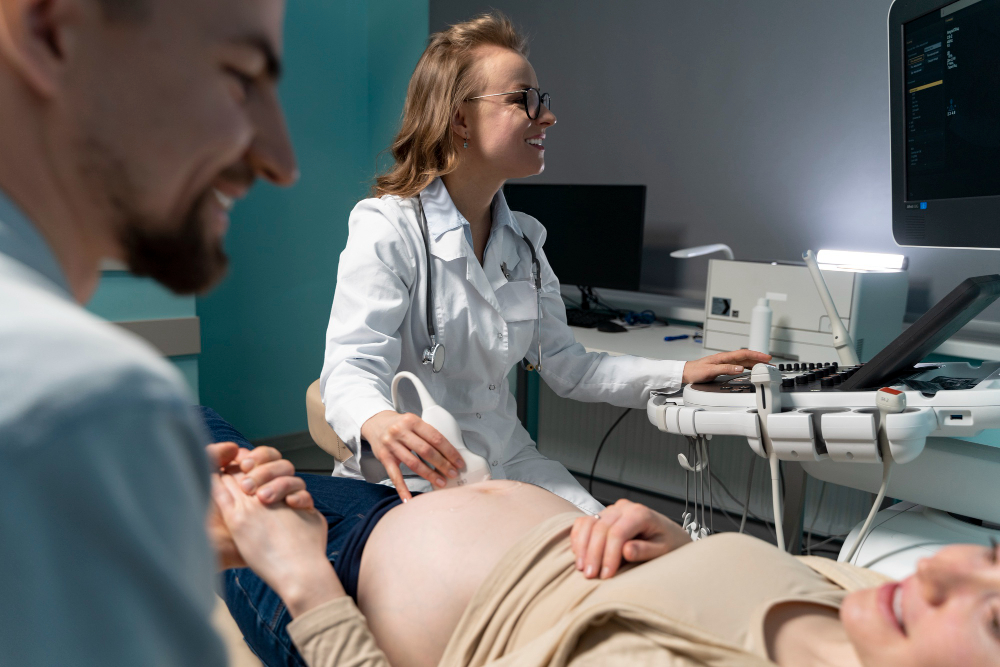Fetal echocardiography is a special ultrasound test that checks a baby’s heart before birth. This test, also called a fetal heart ultrasound or fetal cardiac scan, helps doctors see how the baby’s heart is growing and working. For many expectant parents, understanding this test can bring peace of mind. In this blog, you will learn why fetal echocardiography is important, when it is recommended, and what to expect during the process.
What is Fetal Echocardiography?
Fetal echocardiography is a safe and painless test. It uses sound waves to create pictures of a baby’s heart while still in the womb. Unlike a regular pregnancy ultrasound, this test focuses only on the heart. As a result, doctors can see the heart’s structure, movement, and blood flow in detail. This helps them spot any problems early.
Why is Fetal Echocardiography Performed?
Doctors use fetal echocardiography to check for heart defects before a baby is born. Early detection is important because some heart problems need special care right after birth. In addition, this test can help parents and doctors plan for a safe delivery. Sometimes, it also helps rule out concerns if a routine scan shows something unusual.
When is Fetal Echocardiography Recommended?
Not every pregnancy needs a fetal cardiac scan. However, doctors may suggest it if:
Usually, the test is done between 18 and 24 weeks of pregnancy. But sometimes, it may be needed earlier or later.
How is the Procedure Done?
Fetal echocardiography is much like a regular prenatal ultrasound. First, you will lie down on an exam table. Next, a technician or doctor will put a special gel on your belly. Then, they will move a small device called a transducer over your skin. This device sends sound waves into your body. The waves bounce back and create pictures of your baby’s heart on a screen.
Most of the time, the test takes about 30 to 60 minutes. Sometimes, a vaginal probe may be used early in pregnancy. You can usually go home right after the test.
What Can Fetal Echocardiography Detect?
This test can find many types of heart problems, such as:
Because the test is detailed, it helps doctors plan the best care for your baby. According to the CDC, about 1 in 100 babies are born with a heart defect. Early screening can make a big difference.
Preparing for the Test: What Parents Should Know
Getting ready for a fetal heart ultrasound is simple. Usually, you do not need to do anything special. However, here are a few tips:
Most parents feel a bit nervous, but the test is safe and does not hurt.
Risks and Safety of Fetal Echocardiography
Fetal echocardiography is very safe. It does not use radiation. Instead, it uses sound waves, just like a regular pregnancy ultrasound. According to the World Health Organization (WHO), there are no known risks to the mother or baby. You can feel confident that the test will not harm your baby.
Understanding the Results
After the test, a doctor who specializes in fetal heart care will review the images. Sometimes, you may get results the same day. Other times, you may need to wait a few days. If the test finds a problem, your doctor will explain what it means. They will also talk about next steps and possible treatments. If everything looks normal, you can feel reassured.
Frequently Asked Questions
For more information, you can visit trusted sources like the CDC, WHO, or talk to your healthcare provider.
Conclusion
Fetal echocardiography is an important tool for assessing your baby’s heart before birth. It is safe, painless, and provides crucial information for your baby’s health. If your doctor recommends this test, you can trust its safety and value. Consult the experts at Pratyusha Advanced Fetal Imaging Centre for personalized advice on fetal echocardiography.

